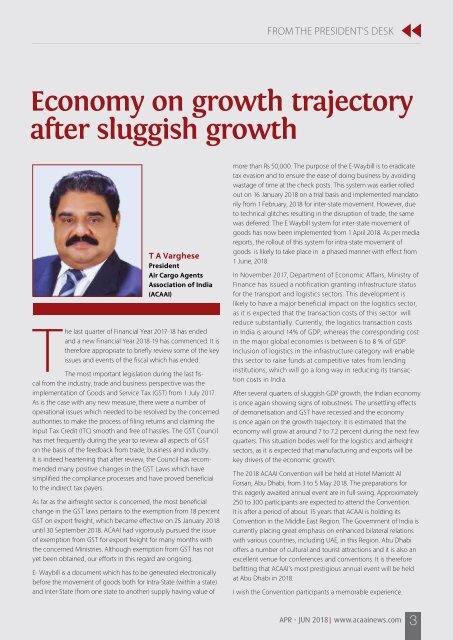Apr-May-June-2018
Create successful ePaper yourself
Turn your PDF publications into a flip-book with our unique Google optimized e-Paper software.
From the President's Desk<br />
Economy on growth trajectory<br />
after sluggish growth<br />
T A Varghese<br />
President<br />
Air Cargo Agents<br />
Association of India<br />
(ACAAI)<br />
The last quarter of Financial Year 2017-18 has ended<br />
and a new Financial Year <strong>2018</strong>-19 has commenced. It is<br />
therefore appropriate to briefly review some of the key<br />
issues and events of the fiscal which has ended.<br />
The most important legislation during the last fiscal<br />
from the industry, trade and business perspective was the<br />
implementation of Goods and Service Tax (GST) from 1 July 2017.<br />
As is the case with any new measure, there were a number of<br />
operational issues which needed to be resolved by the concerned<br />
authorities to make the process of filing returns and claiming the<br />
Input Tax Credit (ITC) smooth and free of hassles. The GST Council<br />
has met frequently during the year to review all aspects of GST<br />
on the basis of the feedback from trade, business and industry.<br />
It is indeed heartening that after review, the Council has recommended<br />
many positive changes in the GST Laws which have<br />
simplified the compliance processes and have proved beneficial<br />
to the indirect tax payers.<br />
As far as the airfreight sector is concerned, the most beneficial<br />
change in the GST laws pertains to the exemption from 18 percent<br />
GST on export freight, which became effective on 25 January <strong>2018</strong><br />
until 30 September <strong>2018</strong>. ACAAI had vigorously pursued the issue<br />
of exemption from GST for export freight for many months with<br />
the concerned Ministries. Although exemption from GST has not<br />
yet been obtained, our efforts in this regard are ongoing.<br />
E- Waybill is a document which has to be generated electronically<br />
before the movement of goods both for Intra-State (within a state)<br />
and Inter-State (from one state to another) supply having value of<br />
more than Rs 50,000. The purpose of the E-Waybill is to eradicate<br />
tax evasion and to ensure the ease of doing business by avoiding<br />
wastage of time at the check posts. This system was earlier rolled<br />
out on 16 January <strong>2018</strong> on a trial basis and implemented mandatorily<br />
from 1 February, <strong>2018</strong> for inter-state movement. However, due<br />
to technical glitches resulting in the disruption of trade, the same<br />
was deferred. The E Waybill system for inter-state movement of<br />
goods has now been implemented from 1 <strong>Apr</strong>il <strong>2018</strong>. As per media<br />
reports, the rollout of this system for intra-state movement of<br />
goods is likely to take place in a phased manner with effect from<br />
1 <strong>June</strong>, <strong>2018</strong>.<br />
In November 2017, Department of Economic Affairs, Ministry of<br />
Finance has issued a notification granting infrastructure status<br />
for the transport and logistics sectors. This development is<br />
likely to have a major beneficial impact on the logistics sector,<br />
as it is expected that the transaction costs of this sector will<br />
reduce substantially. Currently, the logistics transaction costs<br />
in India is around 14% of GDP, whereas the corresponding cost<br />
in the major global economies is between 6 to 8 % of GDP.<br />
Inclusion of logistics in the infrastructure category will enable<br />
this sector to raise funds at competitive rates from lending<br />
institutions, which will go a long way in reducing its transaction<br />
costs in India.<br />
After several quarters of sluggish GDP growth, the Indian economy<br />
is once again showing signs of robustness. The unsettling effects<br />
of demonetisation and GST have recessed and the economy<br />
is once again on the growth trajectory. It is estimated that the<br />
economy will grow at around 7 to 7.2 percent during the next few<br />
quarters. This situation bodes well for the logistics and airfreight<br />
sectors, as it is expected that manufacturing and exports will be<br />
key drivers of the economic growth.<br />
The <strong>2018</strong> ACAAI Convention will be held at Hotel Marriott Al<br />
Forsan, Abu Dhabi, from 3 to 5 <strong>May</strong> <strong>2018</strong>. The preparations for<br />
this eagerly awaited annual event are in full swing. Approximately<br />
250 to 300 participants are expected to attend the Convention.<br />
It is after a period of about 15 years that ACAAI is holding its<br />
Convention in the Middle East Region. The Government of India is<br />
currently placing great emphasis on enhanced bilateral relations<br />
with various countries, including UAE, in this Region. Abu Dhabi<br />
offers a number of cultural and tourist attractions and it is also an<br />
excellent venue for conferences and conventions. It is therefore<br />
befitting that ACAAI’s most prestigious annual event will be held<br />
at Abu Dhabi in <strong>2018</strong>.<br />
I wish the Convention participants a memorable experience.<br />
APR - JUN <strong>2018</strong>| www.acaainews.com<br />
3




